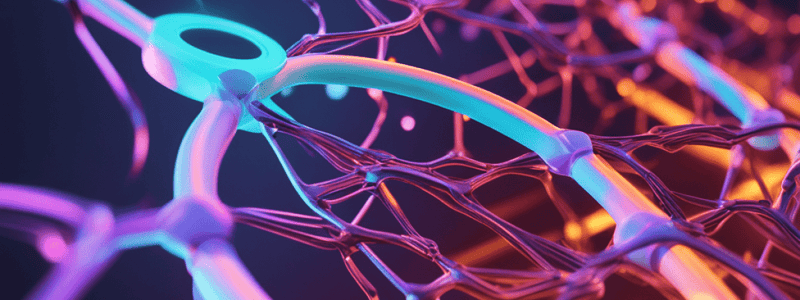Podcast
Questions and Answers
What is the focus of solution electrochemistry?
What is the focus of solution electrochemistry?
Which elements are typically involved in chemical kinetics by d-block elements?
Which elements are typically involved in chemical kinetics by d-block elements?
What differentiates the reactions of d-block elements in chemical kinetics from lighter elements?
What differentiates the reactions of d-block elements in chemical kinetics from lighter elements?
What is the primary focus of electric chemistry?
What is the primary focus of electric chemistry?
Signup and view all the answers
Why is understanding the relationships between chemistry and electricity important?
Why is understanding the relationships between chemistry and electricity important?
Signup and view all the answers
Study Notes
Electric Chemistry is a branch of chemistry concerned with the relationship between electricity and chemical processes. It involves understanding how reactions occur within systems where there is either a flow of electrons or some other type of electrical current. One important aspect of this field is chemical kinetics which deals with the rate of chemical reactions and how reactants can be converted into products. This includes studying the factors that affect reaction rates such as temperature, pressure, and concentration of reactants.
Another area covered under Electric Chemistry is di-block molecules, which consist of two different kinds of monomer units connected together chemically. These polymers are important because they have specific properties based on their structure and the kind of atoms from which they're made. For example, one common type of polymer used in electronics applications is known as PVC, or Polyvinyl Chloride. Its unique combination of strength and flexibility make it ideal for many electronic components.
Baya Molecules refers to organometallic compounds derived from transition metal complexes, particularly those containing a dibenzoylhydrazine group. They were first discovered in 2007 by Dr. Nguyen Hai Duong while working at Imperial College London. In recent years, researchers have been exploring new ways to synthesize these compounds due to their potential industrial applications. Some proposed uses include catalysis, fluorescence, and luminescent materials.
In addition, solution electrochemistry focuses on the study of the interactions between solutions and electrodes when there is an applied voltage across them. Researchers study various aspects including the migration of charged particles, the deposition of metals onto surfaces, and corrosion resistance. Chemical Kinetics by molecule D-Block Elements examines organic reactions involving elements found in the d-block of the periodic table like copper, nickel, cobalt, etc., analyzing how these elements react differently compared to lighter elements.
Overall, Electric Chemistry covers a wide range of subjects related to combining chemistry with electricity. Understanding these relationships allows scientists to develop innovative technologies and systems using controlled energy transfer, thereby advancing human knowledge and application of chemistry in our daily lives.
Studying That Suits You
Use AI to generate personalized quizzes and flashcards to suit your learning preferences.
Description
Test your knowledge on the relationship between electricity and chemical processes, including chemical kinetics, di-block molecules, Baya molecules, and solution electrochemistry. Learn about the connections between d-block elements and organic reactions in this fascinating branch of chemistry.




